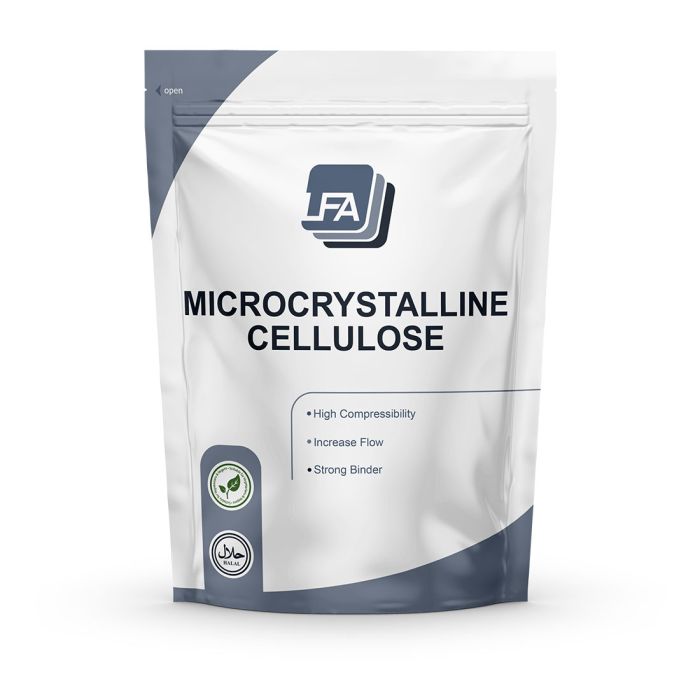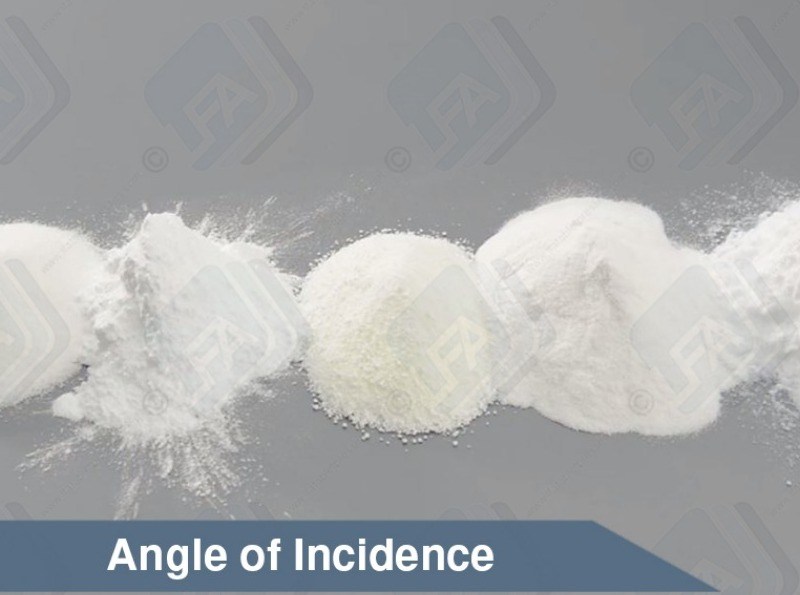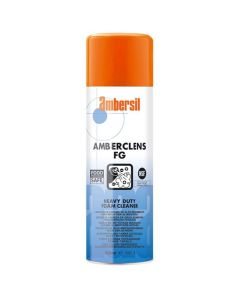Microkristallijne Cellulose
Wat is precies het ideale hulpmiddel? Datgene dat klanten helpt om de inname makkelijker te maken en producenten helpt om de productie eenvoudiger te maken. Niet zomaar een hulpstof die is toegestaan om te gebruiken, maar wel een die meer dan de standaard functionaliteit biedt. Microkristallijne cellulose kan het exacte bindmiddel zijn waarnaar u op zoek bent. Het is geen gel zoals methylcellulose en in vergelijking met andere bindmiddelen heeft de optimale mate van brosheid verstrekt en blijft het tegelijkertijd gevoelig voor glijmiddel.
Belangrijkste voordelen van Microcrystallijne Cellulose
- Hogere samendrukbaarheid
- Hogere flow
- Sterk bindmiddel
- Geurloos, smaakloos
- Non-reactivor
- Lage absorptie
Microkristallijne cellulose, meestal MCC genoemd, wordt geproduceerd in een gecontroleerde omgeving. Het eindresultaat is een zuiver, wit poeder zonder smaak of geur, dat vorm en hardheid toe kan voegen aan uw tabletten. MCC biedt ook de voordelen van een verdunningsmiddel. Het is effectief als vulstof in een tablet of capsule waardoor het het gewenste gewicht heeft voor uw klanten. Microkristallijne cellulose heeft een minimale bulkdichtheid en verhoogde flow eigenschappen. Gemakkelijke flow helpt ervoor te zorgen dat elk ingrediënt consequent wordt verspreid in een mengsel. Als het mengsel consistent is zal elke tablet dezelfde hoeveelheid van elk ingrediënt hebben, waardoor een kwaliteitsproduct ontstaat.
Waarom Kiezen Voor Microcrystallijne Cellulose
Microkristallijne Cellulose doet zijn werk goed. Het werkt goed met vele andere populaire hulpstoffen en is een integraal onderdeel van veel formules van fabrikanten. Bindmiddelen zijn zonder twijfel een cruciaal element in het tabletteermachine proces, simpelweg omdat ze zorgen voor “hardheid” in een tablet. Bovendien beïnvloedt de samendrukbaarheid alle aspecten van het eindproduct, bijvoorbeeld uiteenvallen, oplossen en absorptie. MCC is direct persbaar en daarom kan het tot een tablet worden gecomprimeerd zonder granuleren of een mix te moeten maken, waardoor het totale fabricageproces efficiënter is.
Compressibiliteit en binding zijn beide onbetwistbaar eigenschappen van microkristallijne cellulose. Geen van deze kenmerken doen af aan het vermogen om makkelijk op te lossen in tabletvorm, een cruciaal onderdeel van een tablet of capsule. MCC is veilig om te consumeren in normale hoeveelheden en het wordt breed gebruikt als hulpstof voor tabletteren. Daarnaast is het een natuurlijke bron van voedingsvezels en is het ook niet-calorische. Bovendien is MCC inert, wat betekent dat het niet zal reageren of interfereren met andere stoffen.
LFA's Visie
In het algemeen kan dit product zijn wat u zoekt. Het is zeer gewild, het behoort tot de topverdunners met uitstekende bindende kwaliteiten wn het behoudt deze eigenschappen voor u. Uw formatieproces wordt gemakkelijker als gevolg van dit ingrediënt. Met zijn voordelen en toepassingen is microkristallijne cellulose uw ideale keuze voor een bindmiddel. Het gebruik van MCC naast andere hulpstoffen zorgt dat uw productie soepel en efficiënt draait.
| Naam | Waarde |
|---|---|
| CAS nummer | 9004-34-6 |
| Moleculaire formule | (C6H10O5)n |
| Uitelijk | Fijn wit poeder |
| Fysieke staat | Vast |
| Opslag | Bewaren op kamertemperatuur |
| Smeltpunt | 260–270 °C; 500–518 °F; |
| Dichtheid | 1.5 g/cm3 |
| Oplosbaarheid in water | Geen |
| Documenten |
Intolerantie Data Technische Specificaties |
Wij bieden Microkristallijne Cellulose, magnesiumstearaat, Dicalciumfosfaat en Firmapress in ons assortiment van de hulpstoffen.
Microkristallijne Cellulose is een bindmiddel, waarin de inhoud van de tablet samen.
Dicalciumfosfaat is een vloeiende agent en helpt bewegen ingrediënten door de machine voordat ze worden gecomprimeerd.
Magnesiumstearaat is een droog smeermiddel en helpt weer met de beweging van de ingrediënten door de machine, maar ook helpt bij het uitwerpen van de tabletten uit de machine. Houd er rekening mee dat Magnesium Sterate niet binden door zelf.
Firmapress is een alles-in-een mix van Microkristallijne Cellulose, magnesiumstearaat en Dicalciumfosfaat.
Het is onwaarschijnlijk dat u in staat zullen zijn om te produceren tabletten zonder enig gebruik van Hulpstoffen. Bepaalde producten binden zonder Hulpstoffen, maar dan niet de stroom door het apparaat. Wij adviseren dat u gebruik maakt van een
Ja, al onze Hulpstoffen worden gewonnen uit natuurlijke bronnen. Voor meer informatie kunt u terecht op de individuele product pagina ' s.
here are 6 steps that should be followed as a general rule of thumb when cleaning contact surfaces that have come into contact with powders:
Dry Clean - First you need to remove as much of the dry powder as possible. You can do this using a hover/vacuum. Make sure that the vacuum you are using has a filter good enough to handle fine dust.
Wet Clean - Next you need to perform a wet clean. This can be done with warm water and soap or if available an ultrasonic cleaner.
Rinse - Next you need to rinse off any soap with potable water (drinking water). You do not have to do this if you used an ultrasonic cleaner in the last step. It is important to ensure that all parts are thoroughly dried immediately after washing to avoid any rusting.
Sanitise - Next you need to sanitise the surface. This step is recommended by the FDA. There are a number of sanitising solutions available designed to be applied and left on.
Lubricate - You now need to lubricate any parts that require it. This should be with the appropriate grade oil or grease considering your use and greasing chart. Store - Finally store any of the parts in a cool dry place. If you are storing them on the machine then make sure the machine is in a temperature controlled environment with low humidity.
Firmapress - 2 years form batch date.
Dextrose - 3 years from batch date.
Dicalcium Phosphate - 3 years from batch date.
Microcrystalline Cellulose -
Magnesium stearate -
Lactose - 2 years from batch date.
Silica Dioxide - 2 years from batch date.
Firmapress - 2 years form batch date.
Dextrose - 3 years from batch date.
Dicalcium Phosphate - 3 years from batch date.
Microcrystalline Cellulose -
Magnesium stearate -
Lactose - 2 years from batch date.
Silica Dioxide - 2 years from batch date.
Dextrose - approx 100 mesh
Dicalcium Phosphate - approx 100 mesh
Microcrystoline Cellulose - approx 120-200
Magnesium sterate -
Lactose - 80 mesh
Silica Dioxide -
Firmapress - 100-200 mesh
Yes, all of the excipients are safe for human or animal consumption. There are some precautions that should be taken when handling them and there are some people that might have intolerances to some of them. Information on this can be found in the products MSDS and Intolerance Data Sheet. This can be found in this section for every excipient.
Yes, it does not matter what age, size or sex the person consuming the products is. It is, however, important to check the intolerance data.
Yes. CoA stands for Certificate of Analysis this is also known some times as an MSDS (Material Safety Data Sheet) all of the information contained in a CoA is inside the MSDS for every LFA product which is emailed to you after purchase.
Dextrose - Sweetener, binding agent, good for chewable tablets or candy.
Microcrystalline Cellulose - Binder, filling agent. Good at binding tablets and making them bigger. It can also be used as a filler for capsules.
Magnesium stearate - Dry Lubricant. This stops products from getting stuck to the tooling. It can also help with powder flow issues and caking issues.
Lactose - Binder, sweetener and bulking agent. It has a large mesh so it flows well but most people do not like it because of the intolerance issues.
Silica Dioxide - Flowing agent. This assist powders in flowing smoothly through the machines. It also helps with cacking issues where powders get stuck to the machine.
If your product or API is clumpy then you will need to add an anticaking agent. For this, we recommend silicon dioxide. We only recommend adding a maximum of 2% of this to the mix
If your product is sticky then you will need to add a dry lubricant to your mix. For this, we recommend magnesium stearate.
We do not recommend that you add more than 1% to the mix as more than this can cause capping. If your product is still sticky at this point then we would recommend looking into granulation.
If your product does not bind well then we would recommend using MCC. This can be used in any % the limiting factor is the size of the tablet.
If the amount of MCC you would have to use would be too much or if you do not want to use MCC then you have 3 other options: Ask your supplier for a directly compressible or tabletable grade of your product. Spray dry your product. Wet granulate your product.
Yes. There are two things at play here. You can get hygroscopic and hydrophobic excipients. Hygroscopic means that they take on water quickly, while hydrophobic means that they repel water.
There are products know as supper disintegrants. These products help the breakdown of tablets. At the moment LFA does not sell any supper disintegrants.
Magnesium stearate is hydrophobic this means that it will slow the breakdown of a tablet.
However, it is used in such small amounts that most of the time it will not make a difference to our customer's products. If they would like to be sure then they should conduct what is known as a disintegration test.
Yes, there are all of them can be found in the intolerance sheets for each product. The intolerance sheets can be found here: https://www.lfatabletpresses.com/product-data
FFFFFF 












